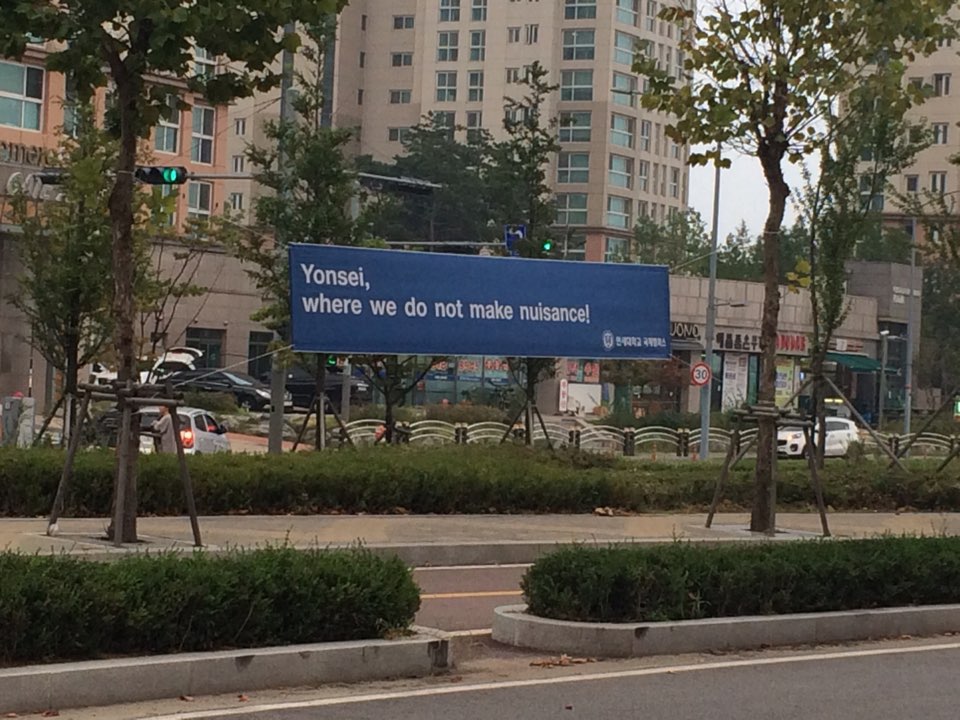The aggravating dissension between Yonsei International Campus (YIC) students and neighboring residents

“PLEASE LET me sleep. There was no loud singing before the beginning of fall semester. But the hollers and cries are driving me crazy every night,” an unnamed resident of Haemoro Worldview apartment reported on Yonsei Bamboo Forest, a Facebook page in which people share their opinions anonymously. Since the establishment of YIC in Songdo, noise pollution has emerged as a significant problem. Nearby apartment residents have protested that students are making too much noise well past midnight. There have also been complaints about students entering apartment complexes without permission, urinating on the streets, and disposing trash everywhere.
The resident’s growing discontentment
Due to continuous disruption, the management office of Haemoro recently sent an official letter of complaint to the vice president of YIC. The letter adamantly requested YIC to discipline the students of their actions outside campus. The residents also petitioned to set the curfew time of the dormitories earlier from 2 a.m. to midnight. Copies of these letters were posted on the bulletin boards in the elevators of each dormitories, alarming the students of the gravity of this problem. In addition, the neighboring residents also put up a banner near Harmony Mart, where students frequently purchase alcoholic beverages. The banner states, “Yonsei, where we do not make nuisance,” which undoubtedly expresses their disappointment and satirizes the school’s slogan, “Yonsei, where we make history.”
However, the residents should beware of making hasty generalizations. Not all students are causing noise pollution. Some do wholeheartedly understand the residents’ distress. “It was a really hot night but I couldn’t open the windows. Too many drunk people were singing,” said Han Ye-rim (Fresh., UIC, Underwood Div.). “My room is near Veritas Hall B, where many students drink at night. The students disturb not only other YIC students but also neighboring residents,” said Park Jun-young (Soph., Dept. of Econ.), the residential assistant of Baek Yang House. Many other students have also voiced their inconvenience about the noise in campus through Yonsei Bamboo Forest.
YIC students are affected too
On the other hand, there were several incidents in which the students were affected by noise pollution coming from the apartment complexes. During the midterms in the fall semester of 2014, Bakmoon Middle School, located right across dormitory 2, held a field day with loud music and ringing cheers. Many students were discomforted by the clamor while studying for their exams. In 2015, the residents physically harmed the students who were sitting by the tables of the convenience store outside of campus. They threw glass bottles and rocks from their apartment building. Although students should not be creating disturbances, violence should never be the answer.
“The relationship needs to be a ‘give and take’ basis,” said Michael Hope (Prof., UIC), a residential master at the Aristotle House. YIC has dedicated effort to construct an integrated community. They have organized free regular public lectures delivered by the professors, entered contracts with local schools for educational service activities, and shared school facilities during vacations with the schools nearby. In addition, the increased presence of YIC students benefits the local businesses in the apartment complex and other shops in the Campus Town Station.
Is reconciliation feasible?
Currently, there are no particular regulations concerning noise pollution outside campus. According to the point penalty chart of the dormitories, students will receive five penalty points if they cause noise within the dormitory. “The students are adults too, so the RC has limited control over student behavior outside campus,” said Professor Hope. Perhaps, developing an impeccable solution to this problem is unrealistic.
Several solutions have been suggested during the RC faculty meetings. One solution was to educate students on proper behavior outside of campus. However, this option becomes inefficient as the annual turnover means a new group of freshmen will come in and behave as typical ‘young adults,’ continuing the vicious cycle. Another solution that was suggested by Allen House was making students sign agreements to behave politely. The problem with this is that students’ actions cannot be consistently monitored outside of campus. It is thus challenging to assess whether students have abided by the agreement.
“The most practicable option is to raise awareness of the escalating dissension among students,” suggested Professor Hope. Students should realize the significance of the noise pollution and be considerate of their neighborhood. YIC is not an exclusive place of Yonsei, but an encompassing atmosphere for the whole community. Likewise, the residents should acknowledge and accept the presence of students in their immediate surroundings.

